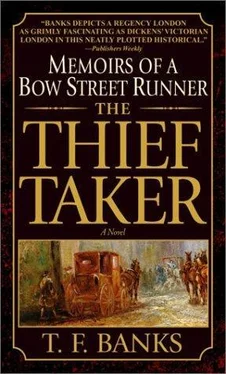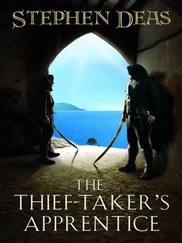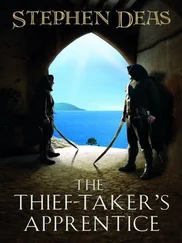T.F. Banks - The Thief-Taker
Здесь есть возможность читать онлайн «T.F. Banks - The Thief-Taker» весь текст электронной книги совершенно бесплатно (целиком полную версию без сокращений). В некоторых случаях можно слушать аудио, скачать через торрент в формате fb2 и присутствует краткое содержание. Жанр: Исторический детектив, на английском языке. Описание произведения, (предисловие) а так же отзывы посетителей доступны на портале библиотеки ЛибКат.
- Название:The Thief-Taker
- Автор:
- Жанр:
- Год:неизвестен
- ISBN:нет данных
- Рейтинг книги:5 / 5. Голосов: 1
-
Избранное:Добавить в избранное
- Отзывы:
-
Ваша оценка:
- 100
- 1
- 2
- 3
- 4
- 5
The Thief-Taker: краткое содержание, описание и аннотация
Предлагаем к чтению аннотацию, описание, краткое содержание или предисловие (зависит от того, что написал сам автор книги «The Thief-Taker»). Если вы не нашли необходимую информацию о книге — напишите в комментариях, мы постараемся отыскать её.
The Thief-Taker — читать онлайн бесплатно полную книгу (весь текст) целиком
Ниже представлен текст книги, разбитый по страницам. Система сохранения места последней прочитанной страницы, позволяет с удобством читать онлайн бесплатно книгу «The Thief-Taker», без необходимости каждый раз заново искать на чём Вы остановились. Поставьте закладку, и сможете в любой момент перейти на страницу, на которой закончили чтение.
Интервал:
Закладка:
“Yes, certainly. But I'll need to speak to you and pose some questions.”
“Indeed, I will want to answer them, when an opportunity presents itself. But let me send my maidservant Nan to you tomorrow; she can provide you with almost anything I could myself. She is closer than a sister to me.”
Morton nodded his agreement. But there was one more question that he wanted answered before he began, and he wanted the answer from no one else.
“Are you acquainted with Colonel Rokeby, Miss Hamilton?”
He thought she blushed, though through the veil he could not be sure.
“I understand,” she said, “how the Colonel must be your first concern. The duel makes that necessary.”
“Runners from Bow Street interrupted that contest,” noted Morton, “after a warning delivered by a lady's maidservant.”
She nodded. “Yes, I sent Nan.”
“And how did you learn of the duel? From Mr. Glendinning?”
“No, in fact, I found out quite by chance. A servant said something. I could not quite believe it. Halbert despised such things. But it was true. Nan confirmed it through the manservant of my half-brother.”
Morton nodded. She had nimbly dodged his original question. “Colonel Rokeby and yourself, Miss Hamilton?”
She sat for a long moment, looking past him. Then she turned her head again.
“To come here at all, I suppose I must trust you, Mr. Morton.” She met his eye in her oblique way, then dropped her gaze and began speaking in a low, expressionless voice. “In an earlier period of my life, under the pressure of…events, I did some very foolish things, Mr. Morton. I was… acquainted with the Colonel, briefly. But I soon broke off any connection between us.”
Morton thought Arabella would likely be proved right again-which she would no doubt be delighted to hear.
“How did he accept this rejection?”
She shook her head. “I really have no notion. Until this duel, I had not thought of or spoken to the Colonel in many months.”
“And your acquaintance with Mr. Glendinning began when?”
She stared blankly.
“Miss Hamilton, you can see the relevance, surely. Was Colonel Rokeby angry enough, or jealous enough, to have wanted to revenge himself upon your fiance? How long ago did your relations with the Colonel come to an end?”
“A year-eighteen months ago. Halbert began to call not long after.” She looked up at him. “Is there more, Mr. Morton? I must return to my home.”
Morton hesitated.
“Can you not simply proceed?” she almost pleaded. “Need I say more about events I am loath to admit even to myself?”
Morton felt the propriety of pressing her no further, at least for now. If he had no solicitude for her feelings, he ought to have for his four hundred pounds. He bowed silently.
“I will send Nan to you tomorrow, with a draught on my bankers.” She rose and stepped toward the door, but then turned. “Mr. Morton? Did I bring this upon poor Halbert? Did my treatment of Colonel Rokeby cause…?” She could not bring herself to say it.
“Even if it were Rokeby, Miss Hamilton, the blame is not yours. Rokeby's actions are his own to account for. No one else's.”
She nodded once, seemed to waver where she stood, then held out her gloved hand, which Morton touched to his lips. Wilkes saw her out.
Morton picked up his glass again, noticing that his guest had not touched her own. Had Rokeby actually taken the step of murder? Certainly the man was a killer, but so far his killings had always been “honourable,” if not strictly legal. Had he killed Glendinning to have revenge on Louisa Hamilton? And had this same woman just engaged Morton to take her revenge upon Rokeby? Was he to be her champion? Sir Galahad indeed?
Morton stared down at her untouched glass and suddenly had the feeling, unbidden, that, for all her grace and refinement, Miss Louisa Hamilton was capable of such a thing.
Chapter 9
Morton descended from his hackney-coach in Petticoat Lane, just south of Highgate Street. The rain had finished and it was clear now, with a bright half-moon shining, so that he could see a long way up and down London's most notorious market for prostitutes. Even well after midnight it was as crowded with figures as a normal street in daylight, women and men moving busily up and down, and the shrill voices of drag-tailed Sally and her sisters began at once to urge him from several sides.
News that there was a “horney” in the neighborhood would spread quickly, so Morton pulled the brim of his topper down over his brow, bent his head, and strode resolutely away. Opposite the East India warehouses he entered Parker's Alley and passed through into the dingy silence of tiny Cox Square. In a few moments he came out into narrower, less frequented Bell Lane.
Here it was much darker, and completely still. The lightless bulk of Constitution Brewery loomed above, blocking out the moonshine. All the old, nondescript buildings on this cheerless street were unlit, except for a dim yellowish glow deep behind the dirty glass of number 12, midway along. Toward this pale beacon Morton made his way, wondering what had brought young Glendinning to such a place. Was Louisa Hamilton utterly wrong in her belief in her fiance's honour? Many women were.
No signboard marked the Otter, but it was a public house for all that, and its door was not latched or guarded. Two stone steps down into total obscurity, around a narrow corner, and then, removing his hat and bending, he passed through a low archway. Just as he did he encountered a fat man dressed like a shopkeeper, who was coming out. Something about Morton seemed to alarm him and he ducked his jowled head shamefacedly, brushing past and out into the street. Morton went into the taproom. Small lamps glowed in the corners, but it took his eyes several moments to adjust to the dimness. He was immediately aware that there were people in the place but, uncannily for a tavern on a normally busy night, there was no movement and no sound. Gradually the forms of low benches along the walls emerged, and two small, freestanding tables. A plank bar ran along one side, behind which, on his stool, sat the hunched, motionless figure of the barman. Behind him, rising over his barrels, a set of steep wooden stairs led upward into even deeper obscurity. At one of the tables two other men sat, looking steadily at the newcomer.
Hat still in hand, Morton made his way across to the empty table, pulled up a flimsy chair, and sat down. The publican very slowly stirred himself and presently arrived at his side.
“Yer pleasure, sir.”
“A line of the old author. And a candle.”
The man shuffled to the far side of the room and fetched one of the small, smoking pewter lamps and set it down before Morton. He was a dry, balding man, perhaps fifty years old, slight of build and dressed in a loose white smock and threadbare trousers. As he slouched away again Morton looked about himself. When his eyes met those of the two men at the other table, they looked down at their hands. He saw now that another figure-apparently a man-lay motionless on one of the benches along the stone basement wall, one arm trailing down with its knuckles in the dirty sawdust covering the floor. Otherwise the room seemed empty. But Morton sensed other presences, other eyes watching him, and set about discreetly trying to find them.
By the time the barman had finished uncorking the dusty bottle and pouring out his glass, Morton had discovered a pale shape in the shadowy corner below and to the right of the bar. There seemed to be some sort of recess in the wall there, perhaps an old root- or ice-cellar, and peering from its depths there was, he saw now, a small, motionless face.
“Lucy!” harshly barked out the keep in a dry, coughing voice. “Where's that little wagtail? Lucy!”
Читать дальшеИнтервал:
Закладка:
Похожие книги на «The Thief-Taker»
Представляем Вашему вниманию похожие книги на «The Thief-Taker» списком для выбора. Мы отобрали схожую по названию и смыслу литературу в надежде предоставить читателям больше вариантов отыскать новые, интересные, ещё непрочитанные произведения.
Обсуждение, отзывы о книге «The Thief-Taker» и просто собственные мнения читателей. Оставьте ваши комментарии, напишите, что Вы думаете о произведении, его смысле или главных героях. Укажите что конкретно понравилось, а что нет, и почему Вы так считаете.












